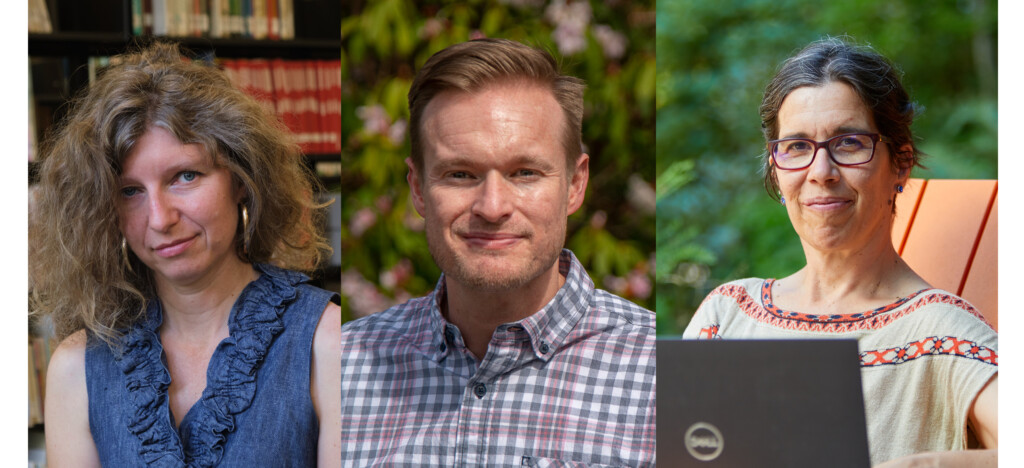Page 37 • (3,073 results in 0.036 seconds)
-
First FloorLibrary circulation and reference desk. IT Help Desk. Lute Lending Library. Center for Student Success. Academic Assistance. Digital Media Center. Reference collection. Microfilm machines. Study rooms. Second FloorBooks and journals in Political Science, Law, Education, Music, Art, Languages and Literature, Science, Medicine, Technology, Military Science, Library Science. Music scores. Curriculum collection. Juvenile collection. African Art Collection. Instructional Technologies
-
April 5, 2012 Film Festival Series: Most People Live in China The Department of Language & Literatures Film Festival Series 2011-2012 presents: Most People Live in China (Norway, 2002) at 5 p.m. Friday, April 13 in Ingram 100. Folk Flest Bor I Kina (Most People Live in China), directed by Martin Asphaug, is a political satire from Norway, consisting of nine separate episodes, each reflecting a different Norwegian political party. PLU Associate Professor of Norwegian and Scandinavian Studies
-

Paul Menzel Professor Emeritus and a Faculty Fellow Email: menzelpt@plu.edu Professional Biography Education Ph.D., Vanderbilt University, 1971 B.D., Yale University, 1967 B.A., College of Wooster, 1964 Areas of Emphasis or Expertise Biomedical Ethics Philosophy & Health Policy Books Prevention vs. Treatment: What's the Right Balance? Co-edited with Halley S. Faust (Oxford University Press 2011) : View Book Strong Medicine: The Ethical Rationing of Health Care (Oxford University Press 1990
Contact Information -

Little Rock, received the grant for their ongoing project titled “An Edition and Translation of Selections from Louise Dupin’s Philosophical Treatise, The Work on Women.” The project aims to present the work of Enlightenment French feminist, author, and philosopher Louise Dupin to a wide audience for the first time by translating and editing a selection of her most important political and philosophical ideas in an approachable anthology. “Making Dupin’s work more accessible to a new generation of
-
student code of conduct The Office of Student Rights and Responsibilities acknowledges that all individuals have a right to freedom of speech and expression as it relates to online activity. However, it is also the responsibility of all PLU community members to understand the impact words or actions can have on other people, and how that could infringe on the rights of individuals.
-
Students intending to attend seminary should complete the requirements for the bachelor of arts degree. Besides the general degree requirements, the Association of Theological Schools recommends the following: English: literature, composition, speech, and related studies; at least six semester-long courses. History: ancient, modern European, and American; at least three semester-long courses. Philosophy: orientation in history, content, and methods; at least three semester-long courses. Natural
-
and learning. We define diversity and sustainability broadly; we engage diversity of race, gender, ethnicity, sexual orientation, but also diversity of world-view, religion, national origin, age, learning style, and even political philosophy. We see sustainability as environmental stewardship but also as a commitment to ecological, social and economic justice aimed at creating a culture of sustainable and responsible citizenship on campus and in our surrounding communities. We pursue Diversity
-
Empire, German Catholics defended Jewish rights not because of a particular affinity for the Jews of their era, but because they believed liberal democracy would respect Catholic rights if it were forced to respect all religious rights. During the years of the Weimar Republic, German Catholics all defend the rights of Jews because this defense applied to the rights of Catholics. More importantly, opposing the Nazis, German Catholics condemned racism as contrary to Catholic teaching, but did not
-
about their discipline,” Torvend said. “There is to be freedom to follow the methods of every discipline in their own way.” That means scholars, including those at PLU, are allowed to pursue ideas that challenge or upset both peers and superiors. It promotes the free exchange of ideas, free from censorship. It means no idea is above scrutiny — or beneath consideration. That philosophy resonates with PLU’s continued mission of thoughtful inquiry, asking big questions and welcoming all perspectives to
-
could not tell professors in English how to go about their discipline,” Torvend said. “There is to be freedom to follow the methods of every discipline in their own way.” That means scholars, including those at PLU, are allowed to pursue ideas that challenge or upset both peers and superiors. It promotes the free exchange of ideas, free from censorship. It means no idea is above scrutiny — or beneath consideration. That philosophy resonates with PLU’s continued mission of thoughtful inquiry, asking
Do you have any feedback for us? If so, feel free to use our Feedback Form.


